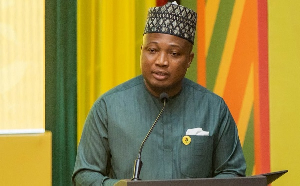Sub-Saharan Africa is a non-entity for many of those at the cutting edge of Western technology. But Africa is intent on bridging the digital divide. In the first of a new series, BBC News Online visits a technology fair in Ghana.
Aitec - West Africa's version of the world's largest computer fair, Cebit - embraces the whole spectrum of technology firms.
Potential clients heading for a more detailed examination of VSAT satellite communication links are stopped by enthusiastic salesmen offering personal computers on three-year hire purchase schemes.
A Nigerian firm offering casing for hardware finds itself next to multinational electronics giant Siemens, which is installing fibre optic links for the government.
British techies extolling the benefits of banking via mobile phones are rubbing shoulders with Ghanaians offering sound cards for home music studios.
While the movers and shakers of Cebit would possibly tut in despair at the haphazard nature and backwardness of much of the exhibition, Africa's untapped potential has offered some entrepreneurs enviable business opportunities.
Virgin territory
"The essence of a developing country is that most things haven't been done, and everything that hasn't been done represents an opportunity," says Hermann Chinery-Hesse, the founder of Ghana's biggest software firm."Africa's like the wild west, you can do things that really change the landscape," agrees UK-born David Bolton, a tech whizz-kid who accepted the challenge to help Ghana's computer programmers on the invitation of the government who discovered his African roots.
"I'm here because it's virgin territory and the last-emerging market," says Alexander Sulzberger, who owns a firm selling wholesale bandwidth to countries along the West African coast.
Demand for bandwidth is growing tremendously, he explains, saying his turnover has risen to $150,000 within two years. "That's simply not possible in any established marketplace," he says.
Old economy trouble
But the enthusiasm of such individuals comes close to being drowned out by the negatives.The demonstration of the much-sought after Linux open source software isn't going to take place: the computers have been detained at the port.
The mishap demonstrates conclusively the troubles of Africa's fast-emerging technology sector: time and time again the pioneers find themselves constrained by the old economy, along with its creaking infrastructure and back-breaking bureaucracy.
Kwami Ahiabenu, director of the Aitec exhibition, shrugs resignedly, as he tells me of the changed agenda, admitting there's nothing that can be done to solve the problem.
Meanwhile, there seems to be a danger that the talking shop, running alongside the technology exhibition, is turning into a complaining shop.
'Tragedy'
Delegates and speakers alike show no signs of holding back as they heap criticism on the government, the telecoms regulator, the Ghana Telecom monopoly and the sporadic supplies provided by the state electricity firm.An employee of Ghana Telecom even describes his firm as "a tragedy", during a speech when he elaborates on his theory that the government doesn't know where its IT strategy is going, nor how it's going to get there.
And an outspoken Nigerian delegate voices his heart-felt frustration that the only way to work with the old-fashioned banking sector is to sack all the existing chief executives and replace them with people who understand technology.
Endless red tape, lack of clear policy, unreliable power supplies and the banks crop up frequently throughout the conference as factors holding the sector back.
Silicon Sahara?
But running beneath the list of woes is a steadfast belief in the potential of Africa to become a Silicon Valleyesque hi-tech hub.Above all it wants to take a slice of the outsourcing that has been won by India's Bangalore, and win the foreign investors that have shunned Africa for so long.
And there is a certainty that technology must be the way to improved economic prosperity.
The debate digresses to inter-country rivalry for the best contender to be that hub: Nigeria has too much corruption, Senegal is francophone, Ghana is not ready yet.
Then some doubters voice their worries that maybe the window of opportunity has already been missed.
Too late
Back at the exhibition, there are long queues forming at certain stands.These are the would-be students who are waiting patiently to fill in registration forms for computer courses in anything from basic word processing to diplomas in programming.
Some admit afterwards that they have no idea how or whether they will be able to find the fees to attend such courses.
But they, like Africa, are determined to find a way of using technology to enter the arena of the global economy.
The great unknown is whether there is still time to catch up.












